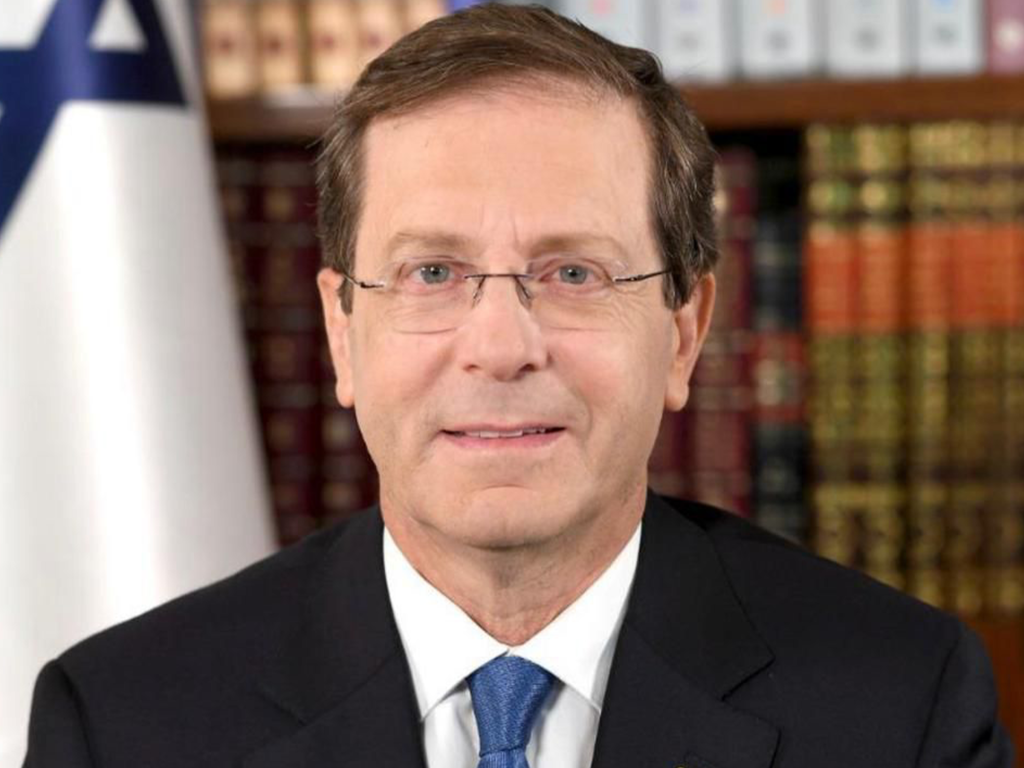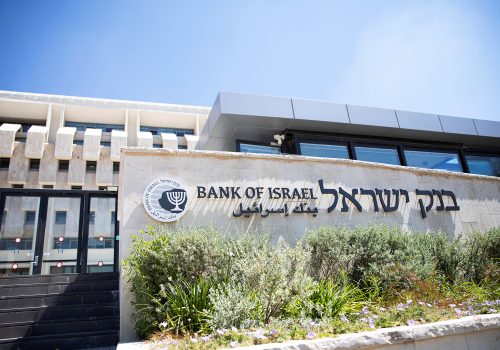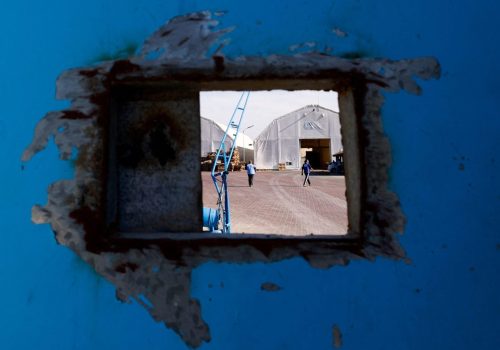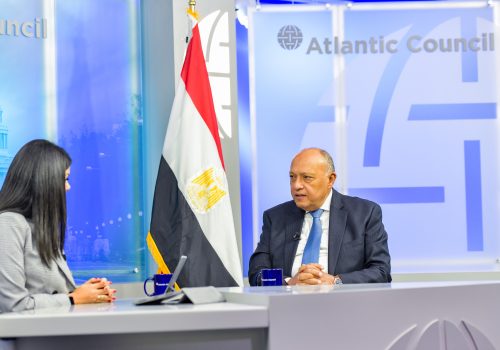Israeli President Herzog: ‘An amalgamation of forces’ will likely govern post-conflict Gaza
Watch the event
Speaking at an Atlantic Council Front Page event on Tuesday, Israeli President Isaac Herzog outlined how his nation’s leaders view outside criticism of its war against Hamas and what a post-conflict Gaza could look like.
In Gaza, “it will have to probably be an amalgamation of forces,” Herzog said, with regional players coming together to decide its future. “I think it’s actually something that can create an optimistic vision for the future, because we have to turn the direction of this region into a different direction.”
Herzog warned that with the memory of the October 7 Hamas terrorist attack so fresh, talk of a two-state solution is “premature,” adding that he believes a key part of the solution will have to include “revamping of the Palestinian political system” away from the status quo.
“Right now, we are in such a national mental mood, that, for most Israelis, it’s not feasible to think about having a border five minutes from where I’m sitting,” Herzog said, joining the event remotely from Jerusalem. “The root of the discussion would be: ‘How could you give anybody the ability to create another Iranian-led platform in the center of the country?’”
Herzog also confirmed that Israel would be willing to pause fighting in Gaza again in exchange for hostages, adding that Israeli Prime Minister Benjamin Netanyahu had met with families of hostages earlier Tuesday to inform them that Mossad leadership was initiating talks to try to broker a break in the conflict.
Here are more major takeaways from Herzog’s conversation with Mary Louise Kelly, the host of NPR’s All Things Considered.
The future of Israel and the Gaza Strip
- “We have to be reasonable about who exactly is going to send boots on the ground from the outside to take over Gaza,” Herzog said. “It’s a complicated question because, as long as there’s no answer to that, only Israel can make sure that terror will not emanate again and again and again from the area.”
- This was a major topic of discussion during US National Security Advisor Jake Sullivan’s meetings with Israeli leaders in Tel Aviv last week. Any outside forces must work “in a forceful manner,” Herzog said, with Israelis needing to be assured that other nations won’t “sit idly by” while enabling Hamas and other groups to operate free of consequences.
- “Remember, in the last two years, Israel opened up its borders and brought in well over twenty thousand employees a day to break bread and work in Israel. It turns out that many of them gathered information on Israeli employers, cities, towns, and villages that they all then went to attack,” Herzog said. “But the question is: ‘How do you create a real economy and a real future in Gaza without hate?’”
Addressing critics
- Israel is well aware of its external criticism, Herzog said. “I know what the world is saying. I see the onslaught of complaints on TikTok and other websites and digital platforms, and I see that the information coming out of Gaza usually is incorrect, to say the least,” Herzog said. “If you look at the social networks and digital platforms, you see a huge amount of hate against Israel, from people who did not delve into the basic facts and the root causes of this conflict.”
- Israel’s national security officials failed to anticipate the October 7 attack, which killed an estimated 1,200 Israelis and precipitated the war in Gaza, in part because of a mistaken assumption “that what Hamas wanted was simply more money and the ability to manage the affairs of Gaza,” Herzog said. “We [had seen] an increase in the standard of living, where there were more investments in Gaza and infrastructure. Things were moving in the right direction. There was an eruption every now and then, but then, after a few days, there was a ceasefire. And the assumption was that Hamas is deterred from any major attacks on Israel.”
- Herzog defended the Israeli military after three Israeli hostages were mistakenly shot while seeking help on Friday, calling their deaths a tragedy while saying that soldiers were at heightened alert from recent Hamas attacks in which terrorists would pretend to be Israeli hostages, with one such attack leading to the death of a battalion commander. “We are managing the war in civilian terrain, where you are in people’s homes, living rooms,” Herzog said, underscoring the difficulty Israel faces while trying to both fight Hamas and avoid civilian casualties.
- Herzog also rejected the idea that Israel has needlessly put civilian lives at risk through what critics have called indiscriminate bombing. “All our activities are followed very closely by legal counsel. I think we’re one of the [world’s] armies which has more lawyers in each unit, in proportion, than any other army. We check all targets. We alert people in advance. We send millions of leaflets. We send millions of text messages. We call people. We give them hours to prepare.”
Looking deeper into the conflict
- Herzog said there have been 121 hostages of various nationalities returned, and there remain 129 hostages being held by Hamas. Herzog said Israel will stay resilient against the “psychological warfare of Hamas,” referencing a video released by the terror group on Monday that shows three elderly captives pleading for support. “We will do whatever it takes, through various means, to bring them back home.”
- Herzog said that the goal of rescuing the remaining hostages had to act in “parallel” with Israel’s stated mission of eliminating Hamas in the region. Without entering Gaza, negotiations that led to the freeing of 121 hostages so far wouldn’t have happened, he said, adding that more work needed to be done to free the rest. However, Herzog said negotiations would remain difficult so long as Israel had to contend with Yahya Sinwar, the Hamas leader in Gaza, who he described as somebody whose psychology “is such that he will do whatever it takes to torture you, to make you suffer, to ache.”
- Herzog said he empathized with the innocent Palestinians affected by the conflict. “I don’t shy away from the fact that every Palestinian who was hurt—it aches and hurts me,” he said. Since the start of the war, the Hamas-run Gaza Health Ministry has reported that nearly twenty thousand people have died in Gaza.
- Herzog posited the two ideologies of Israel and Hamas as diametrically opposed and argued that defeating Hamas should be important for Europe and the United States as well. “The most peace-loving people in Israel, people who were the biggest supporters of peace with Gaza and the Palestinians, were butchered,” Herzog said. “In front of an empire of evil which emanated in front of our eyes—which operates not only in Gaza, it operates in Lebanon, and it now blocks the main trade route going to Europe through the Red Sea, which means this is a world affair—we have to go to war, unfortunately.”
Nick Fouriezos is a writer with more than a decade of experience reporting around the globe.
Watch the full event
Further reading
Tue, Dec 19, 2023
Inside a central bank at war
New Atlanticist By Josh Lipsky
Get a look inside how central banks are springing into action like never before to protect their economies as their countries enter war.
Tue, Oct 24, 2023
The global consequences of the Israel-Hamas war are just beginning. Here’s what to watch.
The Big Story By Kirsten Fontenrose
It's hard to predict what decisions the players will make tomorrow, but here are the early warning signs that could indicate what will come next in the Middle East and beyond.
Fri, Dec 8, 2023
Egyptian Foreign Minister Sameh Shoukry on the Israel-Hamas war and the future of the Middle East
Transcript By
Shoukry spoke at an Atlantic Council Front Page event about the war in Gaza and Egypt’s regional leadership.
Image: Israel's President Isaac Herzog in Jerusalem, Israel on October 24, 2023. Photo by Nicolas Messyasz/Pool/ABACAPRESS.COM



